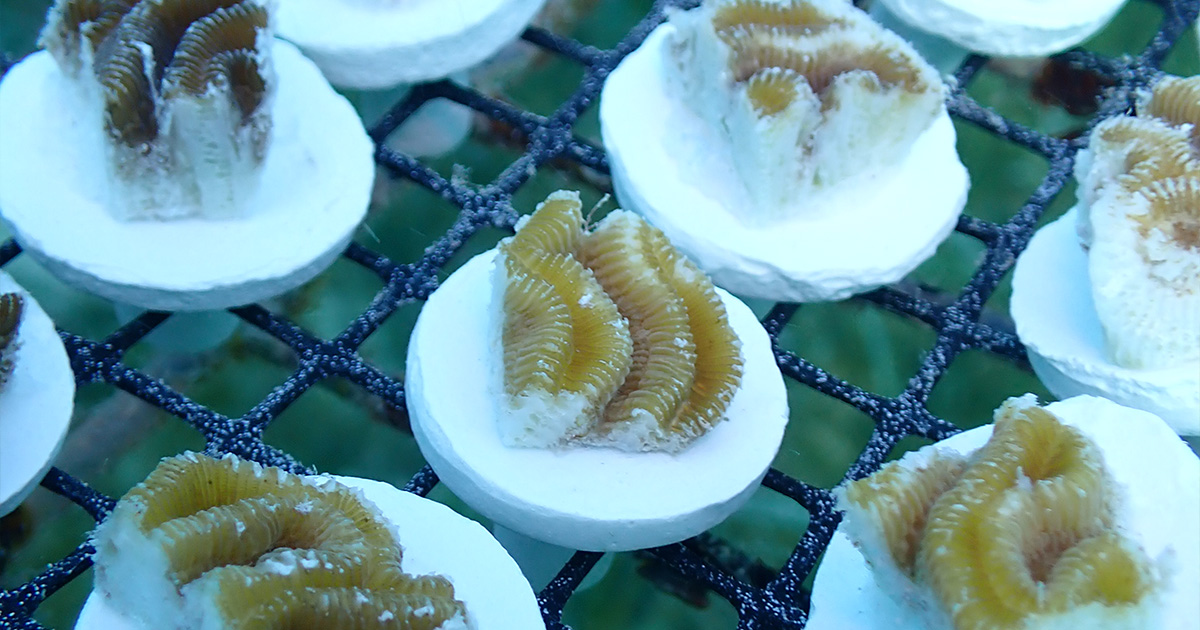The Elkhorn Marine Conservancy has expanded their restoration program to include nine new reef-building coral species in their underwater nurseries, while ongoing coral outplanting efforts span three restoration sites in the Nonsuch Bay region with coral survival rates of 80.5%.
Historically abundant and diverse, marine ecosystems are declining at an alarming rate along with their economic and social value. Coral reefs in particular provide a number of critical ecosystem services that benefit all Antiguans and Barbudans, including coastal protection, food security and tourism opportunities.
With this in mind, the Elkhorn Marine Conservancy (EMC) was established in 2021 to revive degraded marine and coastal ecosystems in Antigua. Since its inception, the EMC has been growing resilient coral fragments in their nurseries and outplanting them onto degraded reef beds to increase the abundance and diversity of corals that once thrived in local waters. Alongside this work, the EMC strives to foster healthy marine environments through collaboration with diverse ocean users, managers, scientists and educators.

Since their first nursery-reared corals were ready for outplanting in July of 2022, the EMC has planted 4610 corals onto degraded reefs around Green Island and York Island on the east coast of Antigua, equivalent to 23,000 square feet (0.53 acres) of restored reef. To increase the resilience of these restoration sites to ongoing threats such as disease, coastal nutrient inputs and climate change, the EMC aims to maximize coral diversity and has outplanted fragments from 42 genetically distinct corals thus far. The EMC is pleased to report an 80.5% survivorship among outplanted coral fragments as of one month after planting.
 The Elkhorn coral, which was nurtured in EMC's nurseries, flourishes as it is outplanted onto the degraded reef bed. The successful growth of the coral showcases the effectiveness of EMC's conservation efforts in restoring the reef ecosystem. (Image Credit: Andre Philip)
The Elkhorn coral, which was nurtured in EMC's nurseries, flourishes as it is outplanted onto the degraded reef bed. The successful growth of the coral showcases the effectiveness of EMC's conservation efforts in restoring the reef ecosystem. (Image Credit: Andre Philip)
In recent months, the EMC has launched a microfragmentation pilot to incorporate boulder coral species into their restoration program. Microfragmentation is the process of cutting coral into small pieces (about the size of a dime, or the width of only several coral polyps). This technique stimulates an increased growth rate up to 40 times faster than typical growth in the wild. Thus far, the EMC has used microfragmentation to propagate fragments from 16 genetically distinct corals of seven different species including numerous endangered species. Through this process, the EMC is now working with over 500 microfragments of boulder corals. The EMC looks forward to outplanting these corals onto restoration sites over the coming year as the fragments reach sufficient sizes. In addition to actively increasing the abundance and diversity of local coral populations, the EMC is developing management strategies in collaboration with local stakeholders to enhance restoration success and ecosystem benefits to local communities.
 With careful attention, the EMC team plants Staghorn coral fragments, which have been nurtured in their nurseries, onto the degraded reef bed. This proactive measure aims to revive the reef ecosystem and promote the growth and recovery of coral populations. (Image Credit: Andre Philip)
With careful attention, the EMC team plants Staghorn coral fragments, which have been nurtured in their nurseries, onto the degraded reef bed. This proactive measure aims to revive the reef ecosystem and promote the growth and recovery of coral populations. (Image Credit: Andre Philip)



